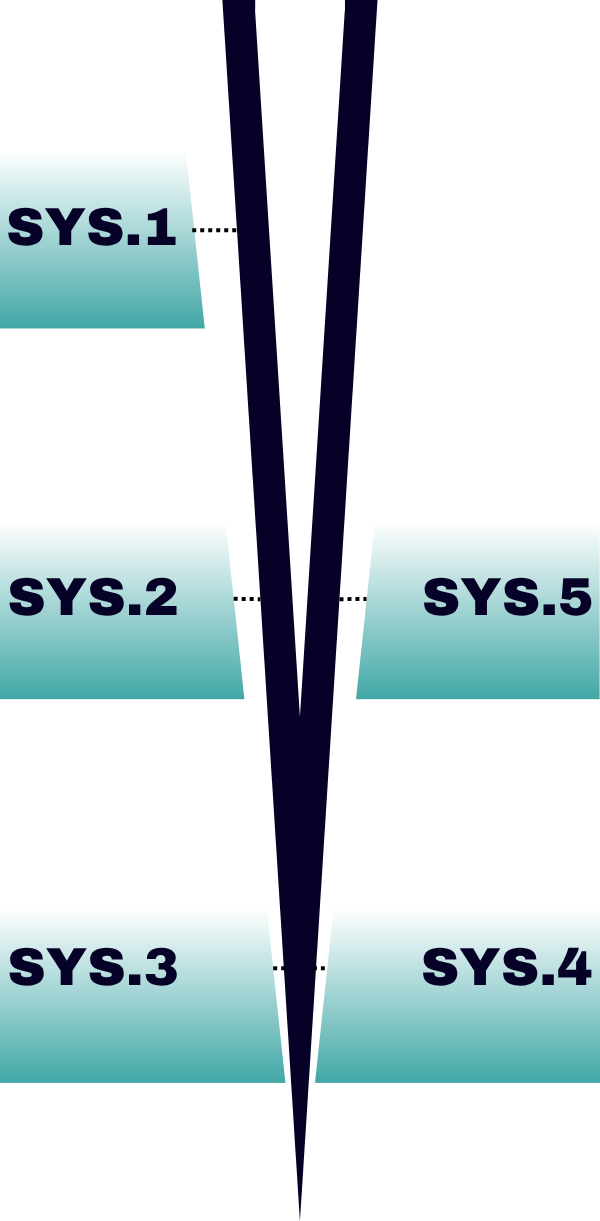System
AUTOMOTIVE
From powertrain to ADAS and infotainment, Piaxo supports full system ownership across all stages of development and integration. Our engineers work across complex vehicle platforms to deliver scalable, standards-compliant ECU solutions trusted by Tier-1s and OEMs across Europe.
Coverage across most in-car ECUs: powertrain, ADAS, connectivity, infotainment, and access systems
Expertise in AUTOSAR (Classic and Adaptive) and Linux-based system architectures
Compliance with ASPICE, ISO 26262, and ISO/SAE 21434
Proven delivery in ASPICE Level 2 and Level 3 projects
Seamless integration into customer platforms and workflows (OEM-specific or legacy)
Rapid onboarding for ongoing or legacy projects with multi-supplier setups
Proficient in tools including Vector, dSpace, Technica Engineering, Jira, and others
System-level expertise across architecture, communication, diagnostics, and safety
System Development Phase
SYS.1 captures client expectations and business needs that shape the product vision. Piaxo supports this by facilitating structured workshops, clarifying safety goals, and identifying constraints like ISO 26262 or UNECE R155 early in the process.
Whether we're working on a central domain controller or a specialized ADAS module, we ensure that every expectation is translated into clear, customer-oriented input for the development lifecycle.
SYS.1 Requirements Elicitation
SYS.2 Requirements Analysis
SYS.2 translates the collected needs into formal, complete, and testable system requirements. This is the foundation for traceability, functional safety design, and ASPICE-compliant development.
Piaxo engineers ensure requirements are unambiguous, structured, and aligned with architectural standards. Using tools like IBM DOORS, Polarion, Windchill or Jama, we provide consistency and coverage across features like diagnostics, over-the-air updates, or BMS communication protocols.
SYS.3 Architectural Design
SYS.3 defines the structure of the system and allocates responsibilities between hardware, software, and mechanical domains.
Piaxo designs architectures that are modular, scalable, and built with reusability in mind. We align our architecture with AUTOSAR and OEM-specific platform rules, helping ensure compatibility, integration readiness, and maintainability across powertrain, infotainment, and body control applications.
System Testing Phase
SYS.4 Integration Testing
SYS.4 focuses on building the full system by integrating all subsystems and verifying their correct interaction. Piaxo prepares integration test environments, develops automation scripts, and executes tests that verify interface behavior, timing accuracy, and control logic. Our work includes everything from HiL setups to real-time communication testing for Ethernet, CAN, and LIN networks—ensuring full system readiness before final qualification.
SYS.5 Qualification Testing
SYS.5 confirms that the system meets all requirements under operational conditions. Piaxo conducts end-to-end test campaigns in close collaboration with the customer, often including on-vehicle validation and test driving in real-world scenarios.
This is the phase where performance, reliability, and safety are validated before the product is released. From EV platforms to luxury supercars, we ensure each system behaves exactly as intended—meeting both OEM expectations and ASPICE maturity goals.
System
Development & Testing
Piaxo supports full system lifecycle implementation with deep focus on verification and validation workflows for automotive ECUs. We develop and test across powertrain, ADAS, and connectivity domains, using model-based design, signal simulation, and real-time validation environments. Our teams handle everything from early interface definition and signal mapping to fault-tolerant behavior implementation, tailored for safety-critical platforms.
System testing is performed using HiL benches (dSPACE, Vector VT, NI PXI) and includes both automated and manual scenarios. We apply smoke testsduring continuous integration, simulate complex signal environments, and conduct integration, boundary, and stress testing to ensure stability before deployment.
Piaxo has a dedicated business unit with impressive capabilities in software testing- SWE4 to SWE6- and system testing -SYS 4 & SYS 5, position ourselves as a key player in relationship with TIER1s and OEMs to obtain the best quality in a short amount of time.
Our approach to System & Software Testing starts from Testing Strategy, Automation Testing, HIL creation until Test Drive (including for super cars), using the leading tool chains of the industry.
-
with dSPACE, Vector VT, and NI PXI platforms
-
during continuous integration cycles
-
for safety feature verification
-
aligned with ISO 26262 and ASPICE
-
(LIN, CAN, FlexRay, Ethernet)
Skills
We like to think of our team as the cool hero in a movie, swooping in with expertise, skills and tools to save the day, ensuring every project’s success.
Check below to see what our standard engineer CV looks like.
Our individual resources
-
Years of Experience: 8-12 years
Knowledge: Proficient in requirements engineering, analysis, and management
Tools: Skilled in using IBM Doors, Polarion, Jama, and other requirements management tools
Methodologies: Experienced in Agile or V-Cycle methodologies
Standards: Familiar with ASPICE and ISO 26262 standards
-
Years of Experience: 7-12 years
Skills: Designing system architectures with an emphasis on safety and reliability
Tools: Expert in UML, Enterprise Architect, SysML, IBM Rational Rhapsody, IBM Doors, Polarion Jama, Vector Davinci Developer/Architect, EB Tressos Studio.
Standards: Knowledge of AUTOSAR, ISO 26262 (QM-ASIL D), ASPICE compliance
-
Years of Experience: 8-12 years
Skills: System-level software development, integration, debugging
Tools: Proficiency in C/C++, Python, real-time operating systems
Standards: Adherence to AUTOSAR and ISO 26262
-
Years of Experience: 10-15 years
Skills: Overseeing system testing strategies for safety-critical components, from QM to ACDD
Tools: Familiar with testing frameworks and management tools
Standards: Expert in ISO/IEC 29119, ISO 26262 (focusing on ASIL D), ASPICE compliance
-
Years of Experience: 5-10 years
Skills: Conducting detailed system testing, including integration and performance tests
Tools: Familiar with automated testing tools and frameworks
Standards: Compliance with ISO/IEC 29119, ISO 26262
-
Years of Experience: 5-10 years
Skills: Specializing in acceptance testing, system validation, and reliability tests
Tools: Experience in test automation and reporting tools
Standards: Adherence to ISO/IEC 29119, ISO 26262
-
Years of Experience: 8-12 years
Skills: Circuit design, electronic systems troubleshooting, hardware integration
Tools: Proficient in CAD software for PCB design, simulation tools like SPICE
Standards: Familiar with industry-specific electronic standards and compliance



